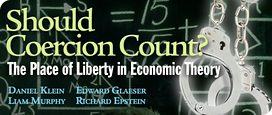I am pleased that Daniel Klein has added yet further wrinkles to our discussion, on which I shall comment briefly on two.
First, there is much truth in Paul Rubin’s provocative suggestion that ordinary individuals evolved in group settings that were not entirely congenial to markets. The point of this observation is that families are bound together by strong genetic ties such that each person within the group takes into account the utility of others as though those utilities were their own. That is a consequence of the common genetic origins. What this proposition entails is that we can expect to see some higher level of cooperation among these individuals than we would expect to see among strangers, so that there is less need for, and less likelihood of, a price system emerging to mediate differences among members of family groups. That proposition is as true of the modern family as it was of our prehistoric ancestors. And it suggests that there is little in these forms of cooperative behaviors that help people reach the kinds of voluntary markets that are needed among strangers.
But by the same token, this is an incomplete account, for even if most interactions take place within the context of a family, there are always some that have to take place among strangers, and for these there are only two ways to proceed, by coercion or consent. The evolutionary impulses on this choice are not all that clear. If there is dominance and you can get what you want, then you will take it, or so the theory goes. But that strategy has serious risks because if the aggression fails, then defeat could happen in the individual case, or, even if the attackers “win,” they could easily be weakened and thus exposed to real losses at the hands of third persons in some subsequent encounters. The cooperative strategy may not give the same instantaneous uptick as aggressive behaviors when they work, but it does not have the same larger downside. So there are pressures toward cooperation in stable arrangements among strangers as a way to avoid the ultimate confrontation. And those instincts also have some genetic base, I suppose, which means that the willingness to engage in market-like behavior is not wholly foreign to the species.
On the normative side, of course, the choice is generally easy: cooperation produces joint gains, and aggression one-sided ones. We therefore should move strongly to endorse the former over the later, and shift that presumption only in rare cases. It is this basic insight that explains why the classical liberal position is so attractive. It is the only political philosophy that, if consistently maintained, promises a steady, relatively risk-free course of human progress.

